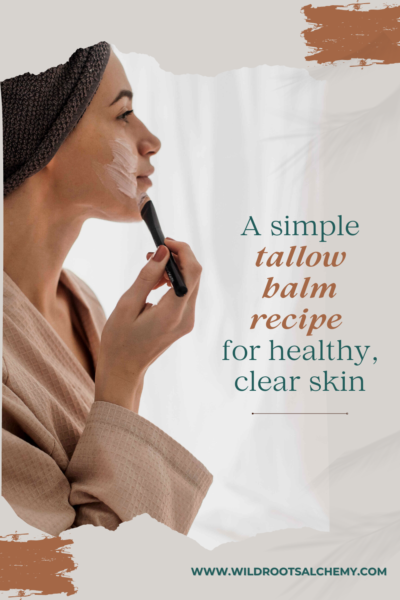
Our bodies are made up of mostly water (about 65-70%, according to some estimates), making optimal hydration an absolutely essential part of our health and well-being.
Water is necessary for every function in your body, and dehydration leads to a host of negative effects on your health. Furthermore, a lack of adequate hydration can significantly impact the health of your skin (leading to conditions like acne and eczema) as well as your hormones!
We may be familiar with the well-intended advice to either drink 8 glasses of water or half our body weight in ounces daily. Yet everyone has different rates of metabolism and water loss, resulting in different hydration requirements. Furthermore, drinking only water as a means to hydration is not the most efficient or healthiest way to stay hydrated. (In fact, drinking too much water can flush out essential minerals.)
It comes down to HOW you hydrate, not just the quantity of water you’re consuming.
Unless the water you’re drinking is able to be properly absorbed and get into your cells, and unless you’re not adding more substances to your body that require water to metabolize and eliminate, it’s possible that you may just end up urinating most of that water out and remain dehydrated!
Chronic Dehydration is Common
Many people are chronically dehydrated to some degree, and you may be dehydrated even if you are not experiencing thirst. If you’re chronically dehydrated, you’ve likely gotten accustomed to functioning without adequate hydration, so your body may turn on other mechanisms (like food cravings) in the hope that you’ll eat foods with high water content.
Symptoms of chronic dehydration:
- Dry mouth and bad breath
- Dry skin, dry eyes, dry lips
- Feeling tired or lightheaded
- Brain fog and inability to concentrate
- Poor mood and irritability
- Body aches and muscle cramps
- Headaches
- Constipation
- Dark-colored urine
- Inability to lose weight
- Poor sleep
- Food and sugar cravings
How Dehydration Impacts Skin and Hormonal Health
Dehydration can impact the health of your skin. If your skin is suffering from a lack of moisture, it’s more permeable to irritants and more prone to inflammation, which can perpetuate conditions like acne and rosacea.
Dehydration can also affect hormonal balance. Dehydration stresses your body, which can promote cortisol dysregulation and HPA (hypothalamic-pituitary-adrenal) axis dysfunction. HPA axis dysregulation inevitably leads to dysfunction in other endocrine glands and an imbalance in their respective hormones, including the ovaries (estrogen, progesterone, testosterone) and thyroid (T4 and T3 thyroid hormones).
As we know, hormonal imbalances can impact the health of your skin, exacerbating the negative effects of dehydration on your skin.
With that being said, it’s important to stay optimally hydrated for your hormone health AND your skin health!
How to Increase Hydration (without drinking gallons of water)
1. Avoid dehydrating substances
Certain foods, drinks, and medications can make it harder for your body to maintain fluid balance and stay hydrated.
Dehydrating foods and beverages include:
- Alcohol
- Soda
- Coffee and caffeinated beverages
- Sugar
- High-sodium foods
2. Reduce your toxic exposure
Environmental pollutants and chemical toxins require water in order to be effectively excreted from the body. By reducing your toxic load as much as possible, you’re taking a burden off of your cells and organs to eliminate these substances.
3. Drink filtered water
Unfiltered tap water contains a large number of toxic contaminants, including pharmaceuticals, pesticides, heavy metals, chlorine, and fluoride. These contaminants place a giant burden on your body to metabolize and eliminate these substances. Your body relies on water to remove these wastes from your body, so the more waste you’ve got, the more water your body needs to get rid of it all.
Drink filtered water using a high-quality filtration system, like a Berkey with added fluoride filters (if you live in an area that fluoridates its water).
4. Add minerals to your water
In order to function properly, your body needs both macrominerals (such as magnesium, calcium, sodium, and potassium) and microminerals (or trace minerals, such as zinc, copper, boron, and manganese).
Add a pinch of sea salt (not table salt, as it only contains sodium chloride) to your water.
5. Drink water first thing in the morning
As we sleep, we naturally lose water through breathing, metabolism, and elimination through the kidneys. If you wake up with a dry mouth, this could be a tell-tale sign that you’re dehydrated. (You might also be a mouth-breather!)
To accommodate for the water lost while we sleep, drink 8-16 ounces of filtered water first thing in the morning, before you eat or drink anything.
6. Drink herbal teas
Herbal teas a delicious and medicinal way to stay hydrated! Plus, many herbs are filled with nutrients that can help keep you properly hydrated, as well as nourish your skin and hormonal system.
Herbs high in minerals include:
- Nettles (Urtica dioica)
- Raspberry leaf (Rubus spp.)
- Oat straw or Milky oat tops (Avena sativa)
- Red clover (Trifolium pratense)
- Alfalfa (Medicago sativa)
- Spearmint (Mentha spicata)
7. Eat plenty of fruits and vegetables
Fruits and veggies are naturally hydrating foods. They contain water, plus a bunch of skin- and hormone-healthy nutrients!
Fruits and veggies with high water content (greater than 90%):
- Cucumbers
- Celery
- Lettuce
- Radishes
- Carrots
- Zucchini
- Bell peppers
- Watermelon
- Grapefruit
- Strawberries
8. Focus on healthy fats
Healthy fats are necessary for healthy cell membranes. If cell membranes are less permeable due to poor lipid composition, they aren’t letting in as much water, so they become dehydrated. You need good fats to help support cellular water transport!
Healthy fats are also essential for hormone production. Cholesterol forms the backbone of all your steroid hormones, which include your sex hormones (estrogen, progesterone, testosterone), cortisol (which regulates inflammation, metabolism, and your stress response), and mineralocorticoids (which regulate water and electrolyte balance).
Tips:
– Avoid trans fats and rancid oils, which contribute to poor cell membrane lipid composition
– Eat foods high in omega 3s and other healthy fats: avocados, olives, coconut, fish, nuts/seeds
By incorporating these techniques into your daily life, you can stay optimally hydrated and support the health of your skin and hormones!
Experiencing symptoms of hormonal imbalances, like acne? Take my FREE quiz to help you figure out which hormonal imbalance is driving your symptoms! You’ll discover your primary hormonal imbalance, and you’ll receive my free ebook (7 Steps to Healing Acne Naturally) along with a ton of awesome tips geared towards your specific imbalance.
Disclaimer: Some of the links to products in this article are affiliate links. I make a small commission off of the sale at no additional cost to you. Thank you for helping to support my small business!





